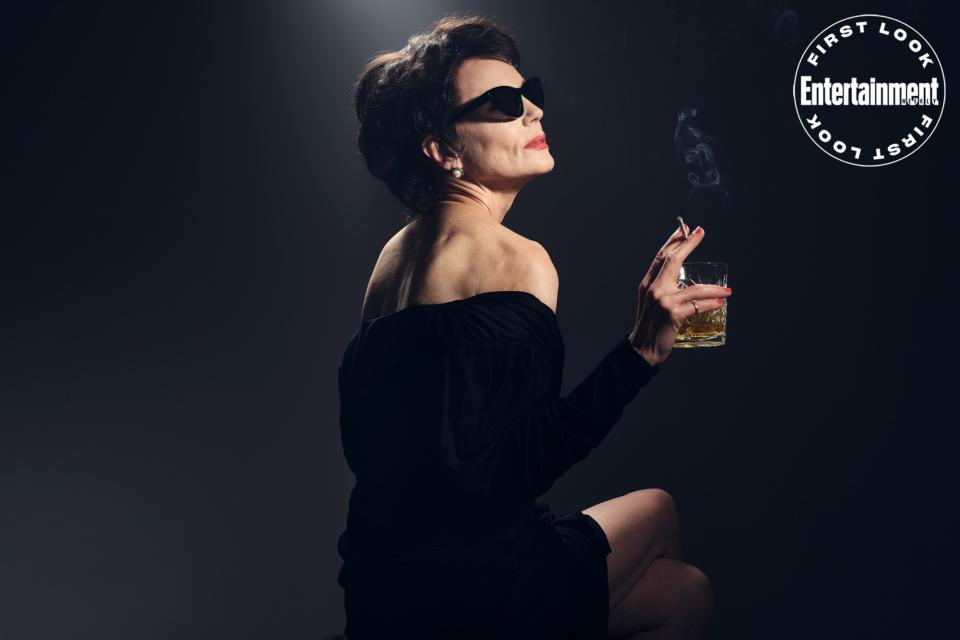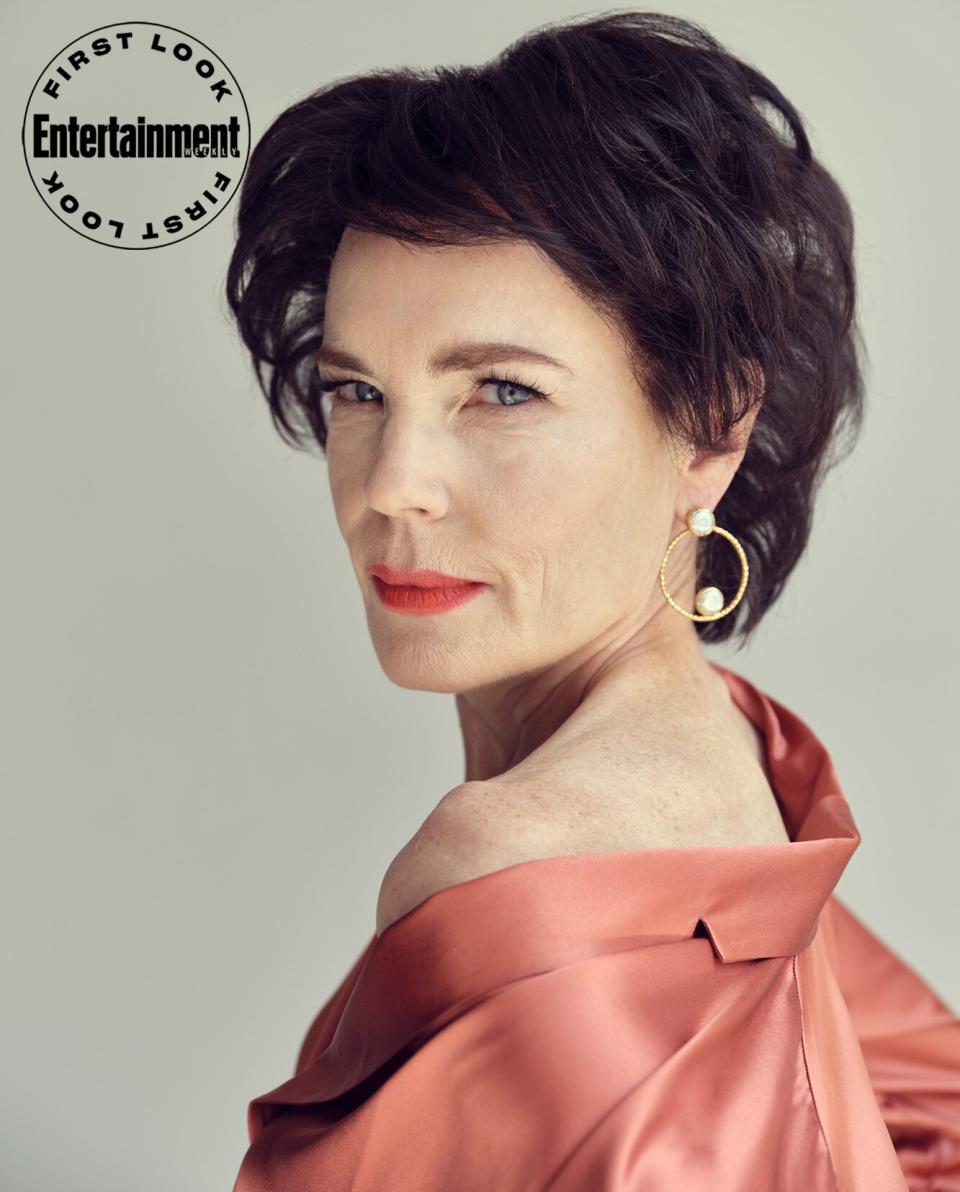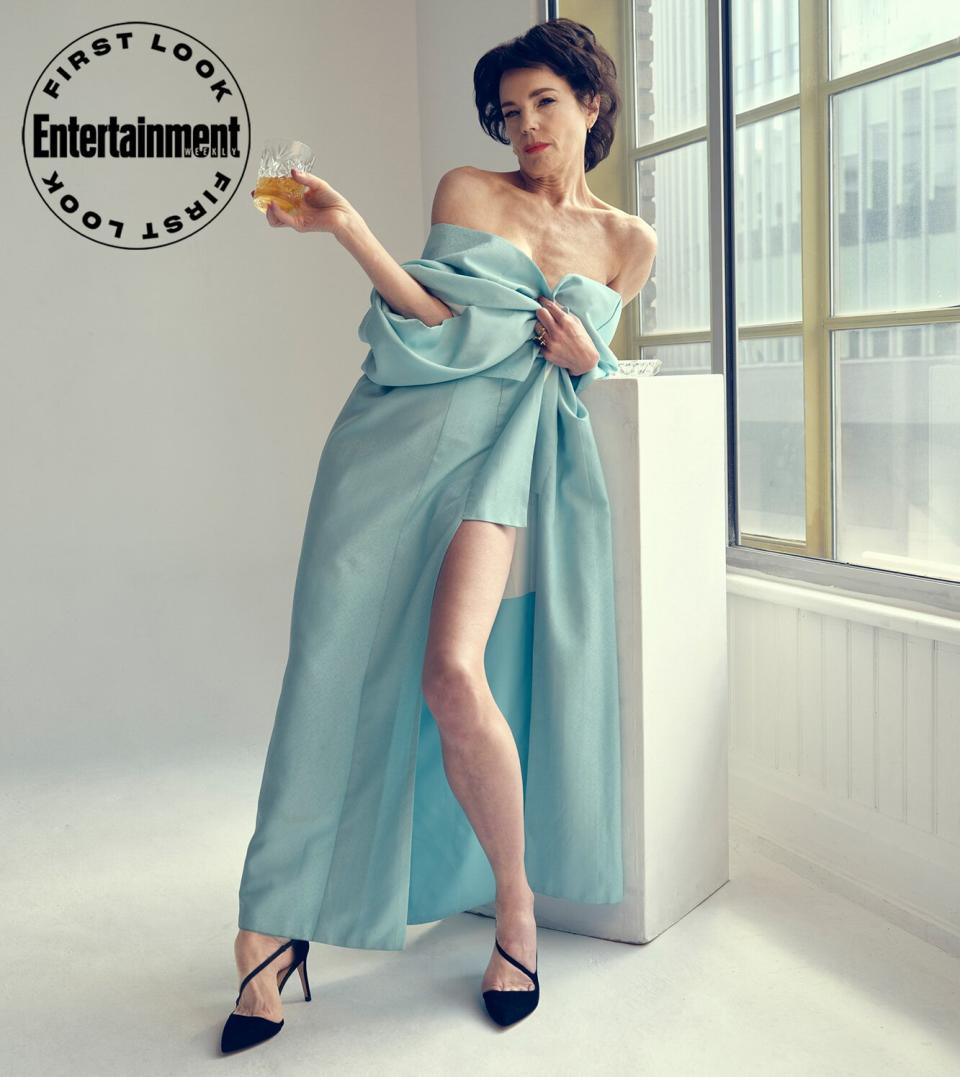Elizabeth McGovern ponders how Ava Gardner would fit in at Downton Abbey

- Oops!Something went wrong.Please try again later.
- Oops!Something went wrong.Please try again later.
- Oops!Something went wrong.Please try again later.
Plenty of luminaries, including the King and Queen themselves, have passed through the halls of Downton Abbey.
But Elizabeth McGovern, who stars as matriarch Cora in the long-running series and corresponding films, is taking on one of the biggest stars of Hollywood Golden Age, the famously tempestuous Ava Gardner, on stage — and she has some thoughts on how the movie star might be received at the English estate.
"Everybody would love her," McGovern muses. "Everybody I talked to who ever worked with her really loved her. She's such a big, warm, expansive character. She would have made quite a splash."
McGovern has come to know Gardner intimately over the last several years, both writing and starring as the woman herself in a new play, Ava: The Secret Conversations. It made its world premiere in London's West End back in January, but it will debut stateside in 2023 at Los Angeles' Geffen Playhouse (it runs April 4 to May 7).
The play, a two-hander, is based on the book The Secret Conversations by journalist Peter Evans and Gardner. Near the end of her life, Gardner recruited Evans as a ghost writer for a tell-all biography. But as Evans works to uncover the truth about Gardner's life, from her infamous marriages to Mickey Rooney, Artie Shaw, and Frank Sinatra, to her complex relationship with Howard Hughes, an unexpected tale unfolds, giving audiences a glimpse into the private life of one of the screen's most legendary femme fatales.
EW has an exclusive first look at McGovern as Gardner in the Geffen's promotional stills, and we caught up with the Downton Abbey star to dive into what it was about Gardner that captured her imagination, why they share a point-of-view in their lives as ex-pats, and more.
Check out the photos of McGovern and her thoughts on Gardner below.

Justin Bettman Elizabeth McGovern ponders how Ava Gardner would fit in at 'Downton Abbey'
ENTERTAINMENT WEEKLY: There's so many incredible stars from the Golden Age era of filmmaking. What was it about Ava in particular that captured your imagination?
ELIZABETH MCGOVERN: To be quite honest, I wasn't particularly familiar with Ava Gardner until I picked up a book that was sitting on my own bookshelf, which was called The Secret Conversations. It was a transcript of the conversations that a man called Peter Evans had with Ava Gardner in her last years living in London. They're published pretty much verbatim. You get Peter telling the story of his attempt to write her autobiography. As I was reading it, it emerged that she was this absolutely, incredibly appealing character. But also I thought this is such an interesting idea. To tell the story of a guy trying to get a life story out of somebody who's an ambivalent subject. Because she wants to tell him and then she doesn't want to tell him. She feels vulnerable and she doesn't want to betray people. So, it becomes a rollercoaster for him and it leads the two of them on a journey toward intimacy, which is as enlightening for her as it is for him. I thought, "Oh, this is such a great story to tell on a stage with two people." They've got this task, which is one of them has to get the life story out of the other one, but instead of that happening, they end up themselves going on a journey that can only be described as a love affair with each other. That is because it's a journey toward intimacy. That's what I thought I would try to capture in this play.
You and Ava are both ex-pats. Was that a point of connection you found with her?
Yes. I mean, that is a lucky coincidence. But there's not a lot of that in the play. The fact that she and I both are living in London is because I really understood her ambivalence about the whole Hollywood thing and what that represented for her. She found, like me, a certain amount of peace and escape in the streets of London. It was that aspect of her that I felt that I could understand.
This is a new venture for you in terms of adapting the book for the stage yourself. What made you want to do that and how was that new challenge?
I've absolutely loved every second of the process, and it's been going on now for years and years. I started it a long time ago. I had this idea, and at first, it was not particularly serious. I just thought, "I have an idea about this story and I want to see if I can make it work." There was a producer here who was very encouraging, and he's still attached to the project. Over the years, we did a couple of workshops with various directors and with different actors. It's been a long process of experimenting and massaging and thinking and working. Then we had the opportunity to do a production here in London. That was also something that was invaluable because I learned so much about how to tell the story and what I wanted to say. I felt that my life history gave me confidence to try to tackle the subject. I wouldn't normally have the confidence as a writer, but there was so much that I had lived that I could bring to it.
Is this version that's coming to Los Angeles next year going to be different in any way from what you did in the West End?
It is. It's been tweaked. It's not massively different, but I learned so much from that production and I could get the experience of constant feedback from the audience. So, I could understand what they were understanding from the story and what they weren't. That helped me do a pretty in-depth rewrite, but I haven't changed it massively. I just figured out ways to enrich the thing that I was already trying to do.

Justin Bettman Elizabeth McGovern as Ava Gardner in 'Ava: The Secret Conversations'
As you were reading this book, and figuring out how to adapt it, what was the thing that really unlocked the writing or your approach to playing her?
Her character flies off the page of the book. Much of that is literally just verbatim. As we worked on it, I grew more and more confident to insert myself but that was the starting point. The thing that took a lot longer was the character of the journalist and his journey. It was an English guy who's a journalist, and it was not a character that I could necessarily understand as easily. Also, it's very challenging, because in the context of the play, he's asking her questions, and he doesn't really get an opportunity to tell his story — what he's going through, why he's there, what he's feeling. Because it's not appropriate in the context of their relationship. It took a lot longer for me to get that part right.
This is a two-hander, and clearly, the structure of the book lent itself to that very naturally. But were you ever tempted to insert any other characters into the story or was it always very clear that it would just be these two people?
It was very important to me to keep the simplicity of the two people. That was the task I gave myself, and I didn't want to stray from it, because I wanted to capture this intense development of a relationship between them. If anybody else walked on stage, it would dilute it. It would suddenly be a whole other thing that I'd have to go off on a tangent to justify. But then I did ultimately create a deus ex machina of a godlike voice, which is the voice of his agent and also becomes the voice of the studio — the people that are the studio heads. Because you flash back in time and they're the that call the shots. Their voice comes in and plays with the narrative, but you never see them.
She died in 1990. Did you ever have any moments where you crossed paths, even from across the room or something?
No, sadly not. But it seems like everybody else has. When we were doing the show, hundreds of people would come up to me and just said, "Oh, Ava, I knew Ava," and they all had an Ava story. She was such a people person. Almost everybody I ever mention it to have, of an age, said, "Oh yes, I remember the time when…" I got lots of feedback that way.
In preparing for this, did you end up with either a favorite one of her films or one that you think has a version of her that's closest to her true self?
I have favorites. If I had to choose one, it would be Mogambo, and I think that is very close to her true self as well. It's a beautiful movie; it really stands the test of time. And then, the other movie I really liked is her first movie called The Killers.
Even though the production is quite hard-eyed about the movie business and about the culture that she had to survive, which was not pretty in many ways, I hope that it's an homage to those kinds of movies that she made and the incredible product of the studio system because it's gone. It really is. I wanted to have both things in the production — both an absolute love for the romance that those movies gave us and the beauty the images gave us, but also take a hard look at the not so nice aspects of the culture.

Justin Bettman Elizabeth McGovern as Ava Gardner in the play 'Ava: The Secret Conversations,' which she also wrote
Was there anything about her life experiences that really shocked you?
No, I mean, what I kept feeling as I was doing the research was that I totally get her experience. So, none of it was shocking. One of the things that struck me is that how much of the machismo, what we would now not tolerate as women, both she and I as young actresses in Hollywood would absolutely not bat an eye at — the way she was treated, the way she was sexualized, the sexual things that were expected of her. It would be absolutely intolerable to anybody today, but was completely not even thought of as anything remiss whatsoever. It's only been recently that the same kind of behavior has taken on a totally different color in today's world.
Your husband, Simon Curtis, who directed My Week With Marilyn, clearly has a grounding in making films about classic Hollywood stars. Would you have any desire to pursue moving this from the stage to the screen if that opportunity came along?
I don't know. You'll have to see it, and then, we can discuss. Of course I would theoretically, but at the moment, I see it as such a piece of theater. It's hard for me to imagine how one would do the story of it on film for various reasons. Because it's not at all a biopic. I hope it's an unexpected journey, because you do learn a lot about Ava Gardner, but it's not really just her life story. It would take some kind of real visionary to figure out how to do the film or television version. I'd be open to ideas. It's very much a theatrical conceit. Never say never. But that definitely wasn't there in the back of my mind. I'm not thinking, "I can't wait till Hollywood gets their hands on this."
She was really renowned for her beauty at the peak of her fame. Were there things about aging and women in Hollywood that you wanted to bring to the forefront and the storytelling?
Yes, I really wanted to give the audience a sense of the toll that it had taken on her life to be blown up in this way and to be viewed as — she was literally called the "sexiest animal alive." That was the ticker tape that was underneath her image. I wanted to create a portrait of somebody trying to live a second act after that had been their first act and struggling, with a lot of courage and humanity and a lot of chutzpah, to do so. But it's an almost impossible thing to pull off. Particularly in her case, because she never had any confidence. She was so humble about her own ability as an actress, and she never thought of herself as a great actress or as a great intellect, even though she was incredibly smart. But because she was so uneducated, she always had a big insecurity about that. She was particularly vulnerable to being used by the system in that way. But because she had such a strong intelligence to her core, she actually lived her life as a feminist before she would even have defined the word for herself. She made choices for herself and was really a liberated woman. That's another thing that I tried to grapple with in the writing, which I found difficult because there was never any point where she was a badge-wearing, sign-carrying rebel of any kind. But she was because of her personality and because of the choices she made. She lived by those choices. But she never had any self-conscious idea about creating a movement or instigating change. She just lived her life. And that was her act of rebellion.
Sign up for Entertainment Weekly's free daily newsletter to get breaking TV news, exclusive first looks, recaps, reviews, interviews with your favorite stars, and more.
Related content:

